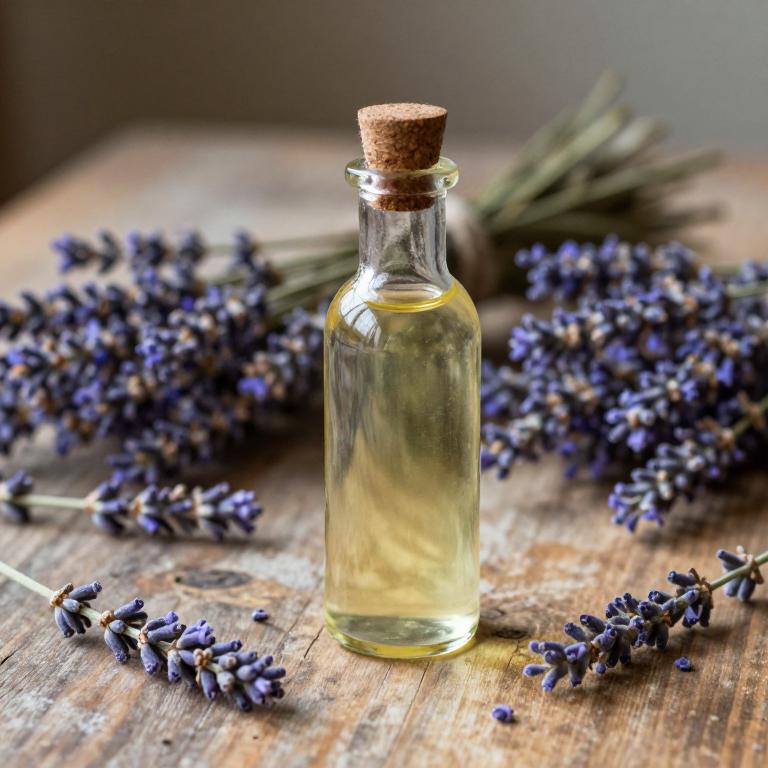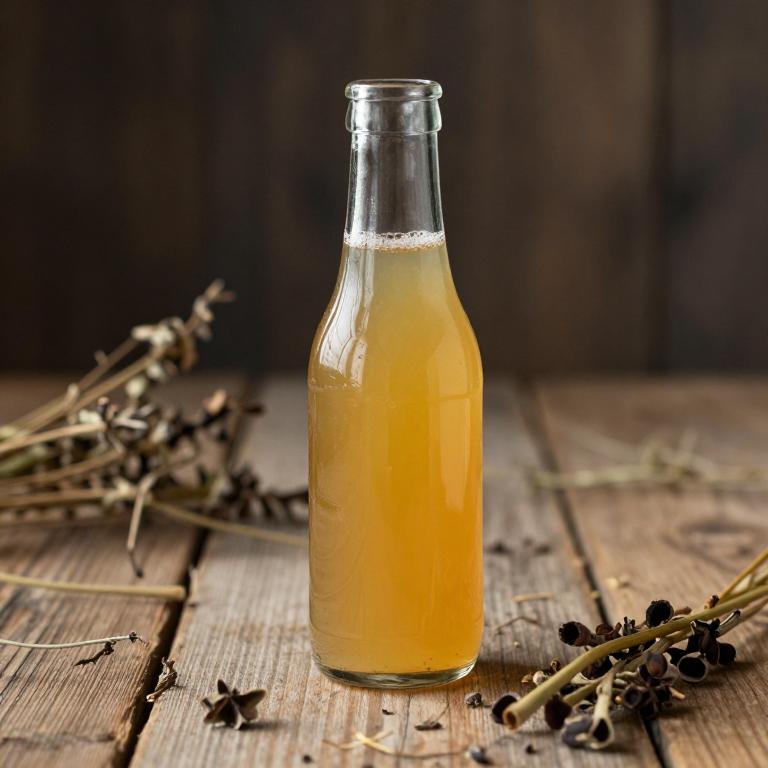10 Best Herbal Juices For Boils

Herbal juices can be a natural and effective remedy for boils due to their antibacterial and anti-inflammatory properties.
Certain herbs like turmeric, ginger, and echinacea are commonly used in herbal juices to help reduce infection and promote healing. These juices can help soothe the skin, reduce redness, and speed up the recovery process when applied topically or consumed internally. However, it's important to consult a healthcare professional before using herbal remedies, especially if the boils are severe or persistent.
While herbal juices may offer some relief, they should not replace medical treatment for serious infections.
Table of Contents
- 1. Aloe vera (Aloe barbadensis)
- 2. Echinacea (Echinacea purpurea)
- 3. Ginger (Zingiber officinale)
- 4. St. john's wort (Hypericum perforatum)
- 5. Turmeric (Curcuma longa)
- 6. Thistle (Silybum marianum)
- 7. Stinging nettle (Urtica dioica)
- 8. English lavender (Lavandula angustifolia)
- 9. Cancer bush (Sutherlandia frutescens)
- 10. Dog rose (Rosa canina)
1. Aloe vera (Aloe barbadensis)

Aloe barbadensis, commonly known as aloe vera, has been widely recognized for its soothing and healing properties, making it a popular choice for natural remedies.
When used in the form of herbal juices, aloe vera can help reduce inflammation and promote skin healing, which is particularly beneficial for treating boils. The gel extracted from the aloe plant contains enzymes, vitamins, and anti-inflammatory compounds that aid in the healing process. Applying aloe vera juice directly to the affected area can help soothe pain, reduce redness, and speed up recovery.
However, it is important to use pure aloe vera juice and avoid products with added sugars or preservatives that may irritate the skin.
2. Echinacea (Echinacea purpurea)

Echinacea purpurea, commonly known as purple coneflower, is a popular herbal remedy often used to support immune function and reduce inflammation.
While it is widely recognized for its potential to alleviate cold and flu symptoms, its use for boils is less commonly discussed. Some proponents suggest that echinacea may help reduce the severity and duration of boils by boosting the body's immune response and promoting healing. However, scientific evidence specifically supporting its efficacy for boils is limited, and it should not replace professional medical treatment for severe or persistent infections.
As with any herbal remedy, it is important to consult a healthcare provider before using echinacea, especially for individuals with allergies or those taking other medications.
3. Ginger (Zingiber officinale)

Zingiber officinale, commonly known as ginger, has been traditionally used for its anti-inflammatory and antimicrobial properties, making it a popular ingredient in herbal juices for treating boils.
The active compounds in ginger, such as gingerol and shogaol, help reduce pain and swelling associated with boils by inhibiting inflammatory pathways in the body. When consumed as a juice, ginger can support the body's natural healing process and may help prevent the spread of infection. It is often combined with other herbs like turmeric or garlic to enhance its therapeutic effects.
However, while ginger juice can be a beneficial complementary treatment, it should not replace professional medical care for severe or persistent boils.
4. St. john's wort (Hypericum perforatum)

Hypericum perforatum, commonly known as St. John's Wort, is traditionally used in herbal medicine for its anti-inflammatory and antiseptic properties.
While it is more widely recognized for its use in treating mild depression, some herbal practitioners suggest that its essential oils and infused juices may help in reducing the inflammation and infection associated with boils. The active compounds in hypericum perforatum, such as hypericin and hyperforin, are believed to have antimicrobial effects that can aid in the healing process of skin infections. However, it is important to note that there is limited scientific evidence supporting the use of hypericum perforatum juice specifically for boils, and it should not replace professional medical treatment.
As with any herbal remedy, it is advisable to consult a healthcare provider before using St. John's Wort, especially if you are on other medications due to potential interactions.
5. Turmeric (Curcuma longa)

Curcuma longa, commonly known as turmeric, is a popular herbal remedy used in traditional medicine for its anti-inflammatory and antimicrobial properties.
Turmeric-based herbal juices are often recommended for treating boils due to their ability to reduce inflammation and prevent infection. The active compound, curcumin, helps in dissolving pus and promoting healing by improving blood circulation to the affected area. To prepare the juice, fresh turmeric root is typically grated and mixed with water or honey for better absorption.
While it can be a beneficial complementary treatment, it is advisable to consult a healthcare professional for severe or persistent boils.
6. Thistle (Silybum marianum)

Silybum marianum, also known as milk thistle, is a herbal plant commonly used in traditional medicine for its potential health benefits.
While it is well-known for its liver-protecting properties, some people use silybum marianum herbal juices for boils due to its anti-inflammatory and antioxidant properties. These juices may help reduce inflammation and promote healing in skin infections like boils by supporting the body's natural defenses. However, there is limited scientific evidence specifically linking silybum marianum to the treatment of boils.
It is important to consult a healthcare professional before using any herbal remedy, especially if you have existing health conditions or are taking medications.
7. Stinging nettle (Urtica dioica)

Urtica dioica, commonly known as stinging nettle, has been traditionally used for its medicinal properties, including its potential to help with boils.
When prepared as a herbal juice, stinging nettle can be beneficial due to its high content of antioxidants, anti-inflammatory compounds, and minerals that support skin health. The juice is believed to help reduce inflammation and promote healing in cases of boils by detoxifying the body and improving circulation. To prepare the juice, fresh stinging nettle leaves are typically washed, blended, and strained to remove the irritants.
While some people use it externally by applying the juice directly to the affected area, it is often recommended to consult a healthcare professional before using it for medical conditions.
8. English lavender (Lavandula angustifolia)

Lavandula angustifolia, commonly known as English lavender, is often used in herbal remedies due to its soothing and antimicrobial properties.
When prepared as a herbal juice, it can be applied topically to help reduce inflammation and promote healing in boils. The essential oils found in lavender, such as lavandin and linalool, have been shown to possess antibacterial effects that may help combat the bacterial infection associated with boils. To prepare the juice, fresh lavender leaves and flowers are typically crushed and mixed with a carrier liquid like water or a mild oil.
While lavender juice can be a natural remedy for minor boils, it is advisable to consult a healthcare professional for more severe or persistent infections.
9. Cancer bush (Sutherlandia frutescens)

Sutherlandia frutescens, also known as cancer bush, is a traditional South African herb that has been used for centuries in herbal medicine.
It is often prepared as a juice or tincture and is believed to support the body's natural healing processes, including the treatment of boils. The plant contains various bioactive compounds, such as alkaloids and flavonoids, which may have antimicrobial and anti-inflammatory properties. When used for boils, Sutherlandia frutescens juice is thought to help reduce inflammation, promote drainage, and support the immune system.
However, it is important to consult with a healthcare professional before using this herb, especially for persistent or severe infections.
10. Dog rose (Rosa canina)

Rosa canina, also known as rosehip, is a rich source of essential nutrients, including vitamins C and E, antioxidants, and omega-3 fatty acids, which make it beneficial for skin health.
When used in the form of herbal juices, rosa canina can help reduce inflammation and promote healing in cases of boils due to its anti-inflammatory and antimicrobial properties. The high concentration of vitamin C in rosehip juice supports the immune system, aiding the body in fighting off infections that may contribute to boil formation. Additionally, the antioxidants in rosa canina juice help neutralize free radicals, which can further support the skin's natural healing process.
However, it is important to consult a healthcare professional before using rosa canina juice for boils, especially if you have underlying health conditions or are taking other medications.